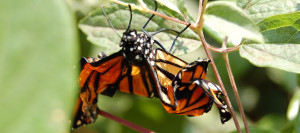By Mike Weilbacher
It’s high summer, which brings with it erratic weather patterns, fierce storms, rising tides, raging stormwater pouring through our communities, and other climate change concerns. As someone who worries about climate change, I have stumbled upon a powerful way to change the world.
We need to think like butterflies.
Consider the butterfly–born as a humble, often ugly caterpillar. A living weed-whacker, caterpillars plow through living plants, mercilessly devouring leaves, hell-bent on defoliation. Tent caterpillars ravage the Schuylkill Center’s cherry trees every spring; gypsy moths ravage whole landscapes. Last year, I planted a stand of dill to attract black swallowtail caterpillars, since that’s one of its host plants. The plan worked: the dill raised about 15 caterpillars, but was a skeleton when the caterpillars were done. Not one living leaf remained.
The caterpillars crawled away, hung upside down, and transformed into chrysalises–their body parts magically melting inside their shells to rearrange as completely different body parts. And a wickedly different creature emerged, the adult.
Monarch butterflies are exquisite botanists, the females laying their eggs only on members of the milkweed family. Caterpillars ingest the leaves, using toxic chemicals in the leaf’s milk to make them taste terrible—their protection from predatory birds.
While the caterpillar devoured everything, the butterfly has no mouthparts whatsoever for eating solid food. As if making penance for the sins of its youth, a butterfly drinks its world, using its coiled straw of a mouth to sip nectar. When the butterfly flits from flower to flower, it pollinates each in turn, allowing it to make seeds. That’s the key: while the caterpillar takes from the world the resources it needs for survival, the butterfly gives back, turning flowers into seeds that grow the next generation of flowers. Caterpillars devour, but butterflies pollinate.
And they don’t just pollinate the zinnias in your backyard. They pollinate the native plants that sustain entire ecosystems; there would be no milkweeds without the pollinating work of butterflies. More importantly, pollinating insects like bees and butterflies enable so many flower trees to make fruit. Oranges, cherries, grapefruit, grapes (and therefore raisins and wine), apples, lemons, limes: all are produced by pollinating insects like butterflies.
For millennia, humans have been caterpillars, taking from the world the stuff we need to live: food to eat, water to drink, lumber to build homes, coal and oil to power our lives. Living on a finite planet on limited resources, we’re running out of stuff to devour. For us to live sustainably, it’s time we grew up. Metamorphosed. Transformed into butterflies, giving back to the resources that sustain us, metaphorically pollinating the world and making seeds.
Thinking like a butterfly means conserving water, switching to renewables, buying electric cars, radically recycling everything, growing our own organic food, protecting biological diversity, cooling the climate, consuming less stuff, ceasing suburban sprawl across whole landscapes, and so on.
Protecting biological diversity means inviting your nonhuman neighbors into your yard: growing milkweed plants to nurture populations of monarch butterflies, installing bat boxes to support troubled bat populations, keeping your cat inside so it doesn’t kill birds, planting native plants everywhere you can, and more.
Thinking like a butterfly also means getting to know butterflies. They are remarkable, delightfully colorful creatures, extraordinarily adapted—and vanishing. We’ve got a butterfly event happening soon at the Schuylkill Center—come help us count them. And we’ll continue the conversation about thinking like a butterfly.
Click her to learn How to Grow a Butterfly Garden
Thursday, July 5, 1 pm, $3/person
Help our staff count the butterflies in our forests and meadows in an annual effort orchestrated by the North American Butterfly Association. To register, call 215-482-7300 ext. 110 or email [email protected].

